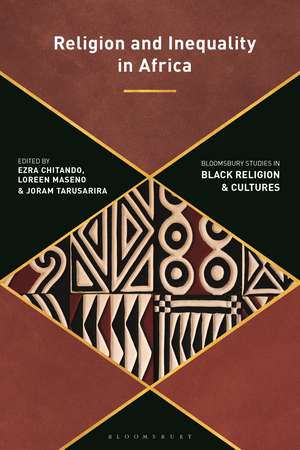Religion and Inequality in Africa: Bloomsbury Studies in Black Religion and Cultures
Editat de Ezra Chitando, Loreen Maseno, Joram Tarusariraen Limba Engleză Paperback – 21 aug 2024
| Toate formatele și edițiile | Preț | Express |
|---|---|---|
| Paperback (1) | 193.07 lei 3-5 săpt. | |
| Bloomsbury Publishing – 21 aug 2024 | 193.07 lei 3-5 săpt. | |
| Hardback (1) | 512.22 lei 6-8 săpt. | |
| Bloomsbury Publishing – 11 ian 2023 | 512.22 lei 6-8 săpt. |
Preț: 193.07 lei
Preț vechi: 250.30 lei
-23% Nou
Puncte Express: 290
Preț estimativ în valută:
36.94€ • 38.58$ • 30.51£
36.94€ • 38.58$ • 30.51£
Carte disponibilă
Livrare economică 25 martie-08 aprilie
Preluare comenzi: 021 569.72.76
Specificații
ISBN-13: 9781350307414
ISBN-10: 1350307416
Pagini: 288
Ilustrații: 2 bw illus
Dimensiuni: 156 x 234 x 25 mm
Greutate: 0.43 kg
Editura: Bloomsbury Publishing
Colecția Bloomsbury Academic
Seria Bloomsbury Studies in Black Religion and Cultures
Locul publicării:London, United Kingdom
ISBN-10: 1350307416
Pagini: 288
Ilustrații: 2 bw illus
Dimensiuni: 156 x 234 x 25 mm
Greutate: 0.43 kg
Editura: Bloomsbury Publishing
Colecția Bloomsbury Academic
Seria Bloomsbury Studies in Black Religion and Cultures
Locul publicării:London, United Kingdom
Caracteristici
Offers a probing review of the different forms of inequality in Africa and the extent to which religion is implicated in solidifying them, as well as providing valuable reflections on how religion can be a resource in responding to multiple forms of inequality in Africa
Notă biografică
Ezra Chitando is Professor of History and Phenomenology of Religion, University of Zimbabwe, Zimbabwe, and Theology Consultant on HIV and AIDS for the World Council of Churches. He is also an extraordinary professor at the Desmond Tutu Centre for Religion and Social Justice, University of the Western Cape, South Africa.Joram Tarusarira is Assistant Professor of Religion, Conflict and Peacebuilding at the University of Groningen, the Netherlands. Loreen Maseno is Research Fellow in the Department of Ancient and Biblical Studies, University of South Africa, South Africa, and Senior Lecturer in Religion, Theology and Philosophy at Maseno University, Kenya.
Cuprins
Introduction, Ezra Chitando (University of Zimbabwe, Zimbabwe), Loreen Maseno (Maseno University, Kenya) and Joram Tarusarira (University of Groningen, Netherlands)Part I: Religion and Inequality: Country Case Studies1. Sleeping with the Enemy: The Entanglement of Religions with Inequalities in Nigeria, Sokfa John (University of KwaZulu-Natal, South Africa)2. Religion and Inequalities in Mozambique, Júlio Machele (Eduardo Mondlane University, Mozambique), and Mário Jorge Carlos 3. Diaspora African Communities, Religion and Inequality, Nomatter Sande (Research Institute for Theology and Religion, South Africa)Part II: Religion, Gender and Inequality4. The One Man Jihad: Sarki Sanusi Lamido Sanusi (SLS) and Hausa Muslim Women's Status in Northern Nigeria, Rahina Muazu5. Negotiating Gender Inequality in Religious fields: Bishop Margaret Wanjiru's use of Charisma and Social capital in Kenya, Loreen Maseno (Maseno University, Kenya)6. Interrogating the "Spiritual Puzzle of Silence" on Religion and Gender Inequality in Tanzania, Alexander Makulilo (University of Dar es Salaam, Tanzania)7. Religio-Cultural Beliefs and Women's Political Participation: Gender Dimensions in Post-Constitutional Elections in Eswatini, Sonene Nyawo (University of eSwatini, eSwatini)8. Policing boundaries of the body? Spirit-type African Apostolic churches, HIV/AIDS and Inequality in the Eastern Zimbabwe; 1985-2015, Nicholas Nyachega (University of Minnesota-Twin Cities, USA) and Kudzai Biri (University of Bamberg, Germany)9. Religious Homophobia and Inequality in Malawi, Jones Hamburu Mawerenga (University of Malawi, Malawi)Part III: Religion, Disability, Age and Inequality10. Gender Inequality and Disability Among the Ndebele Religio-Cultural Communities, African Women Theologies of Disabilities Praxis, Sinenhlanhla S. Chisale (University of Pretoria, South Africa) and Kesiwe Phuthi (University of South Africa, South Africa)11. Born free? Born free for what? Exploring the lived experiences of Christian young adults in South Africa regarding inequality and social justice, Nadine Bowers Du Toit (University of Stellenbosch , South Africa), Dione Forster (University of Stellenbosch , South Africa), Shantelle Weber (University of Stellenbosch , South Africa), and Elisabet Le Roux (University of Stellenbosch , South Africa)12. Religion and Income Inequality among Retirees in Botswana: A Communal Contextual Theological Approach, Tshenolo J. Madigele (University of Botswana, Botswana) and Ronald Tshelametse (University of Botswana, Botswana)Part IV: Religious Movements and inequality13. Dis/continuity of economic inequality and New Prophetic Churches in post-1994 South Africa, Mookgo Solomon Kgatle14. Prosperity, Philanthropy and Social Differentiation: Neo-Pentecostalism and Socio-Economic Inequality in Harare, Simbarashe Gukurume (Institute of Development Studies, UK)15. The "Let Our Voice Be Heard"(LOVB) Movement among Ethiopian Muslims: Realized, Aborted, or Suspended?, Mukerrem Miftah (Ethiopian Civil Service University, Ethiopia)NotesBibliographyIndex
Recenzii
At a time when Africa's inequality question is often tilted towards the economic and political, this volume takes a forward leap. Bringing together newer voices to dissect the twin subjects of religion and inequality, the editors of this volume contribute to our understanding of everyday life in Africa. This book is well detailed, clearly written, easily understandable and above all, it is important reading for almost anyone.
In an era when the Covid-19 Pandemic has exposed grave socio-economic inequalities both within nation-states and at a global level, this important and innovative collection examines how religion can discriminate along lines of wealth, race and ethnicity, gender and sexuality, age and physical ability in a manner that blights individual and societal development within Africa and beyond. Written by a dynamic group of scholars, each chapter brings a fresh and innovative approach to the subject matter. The provocative case studies raise key questions for debate and set an important agenda for social and economic transformation.
In an era when the Covid-19 Pandemic has exposed grave socio-economic inequalities both within nation-states and at a global level, this important and innovative collection examines how religion can discriminate along lines of wealth, race and ethnicity, gender and sexuality, age and physical ability in a manner that blights individual and societal development within Africa and beyond. Written by a dynamic group of scholars, each chapter brings a fresh and innovative approach to the subject matter. The provocative case studies raise key questions for debate and set an important agenda for social and economic transformation.










